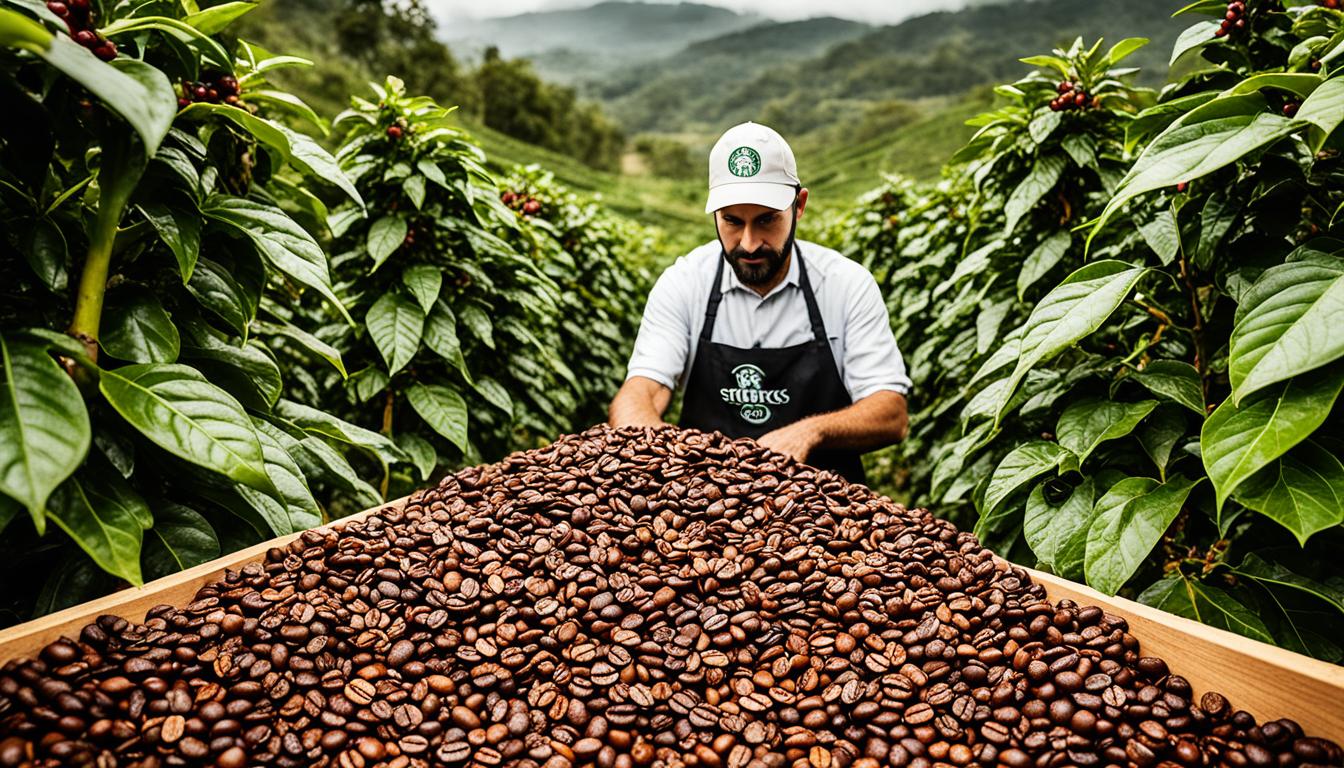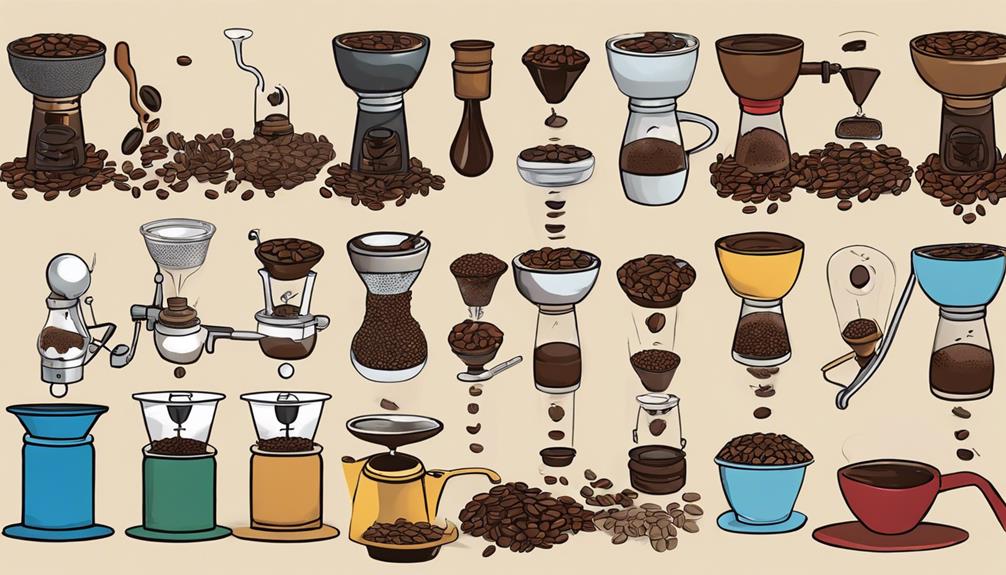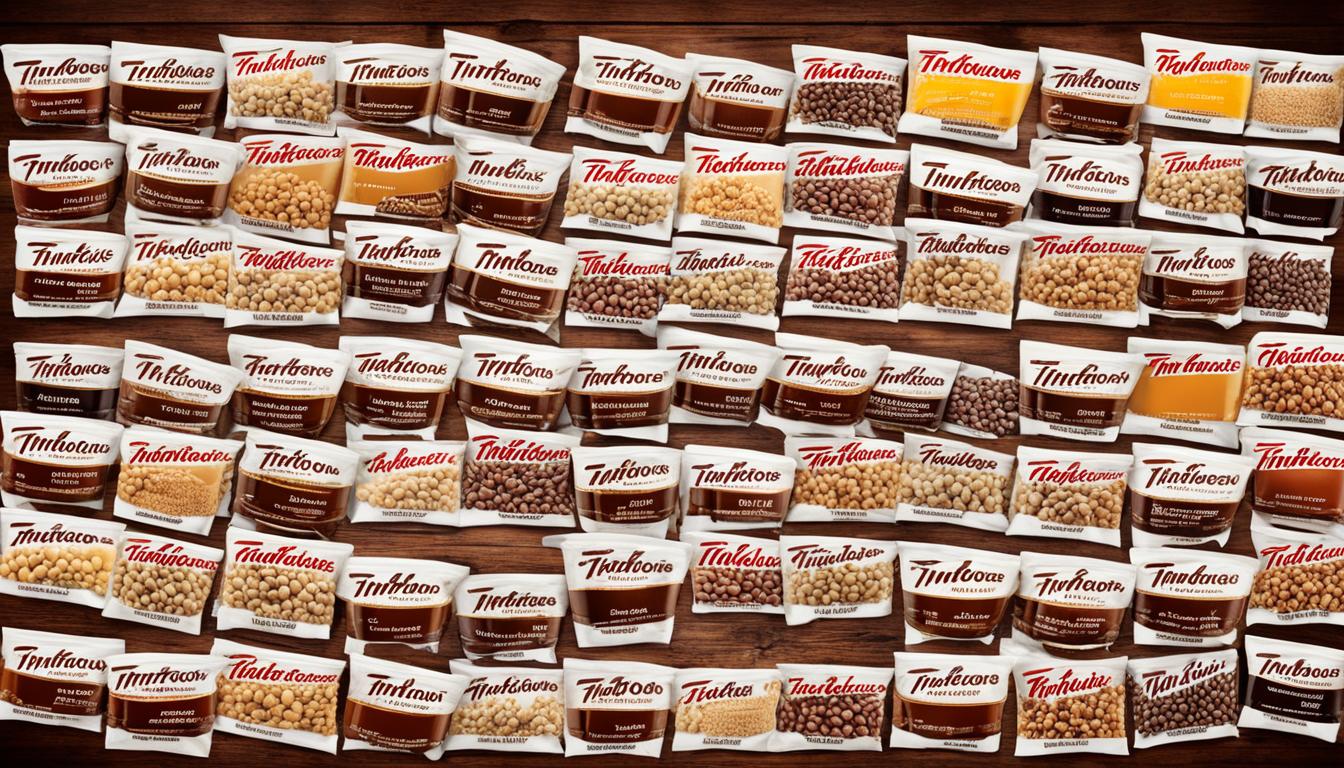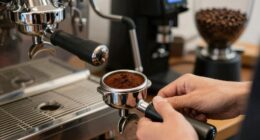Did you know that there are approximately 3,212 coffee roasters in the United States? Each roaster has its own unique way of sourcing and roasting coffee. This significant number of roasters is contributing to the ethical coffee movement, which is gaining popularity as consumers become more conscious of their purchasing decisions. The competition between major companies like Starbucks and smaller, local coffee shops is becoming more prominent.
This article looks at how Starbucks and local roasters handle ethical coffee. Starbucks is known for its 99% ethically sourced coffee. They’ve also put more than $100 million into helping coffee communities. Local roasters, though, usually work more closely with farmers. They also play a big role in their local economies.
As people learn more, their coffee choices can really make a difference in the industry. Will they stick with Starbucks, or choose the unique touch of local roasters? Let’s dive into the ethical brew battle and what drives these decisions.
Key Takeaways
- The United States hosts approximately 3,212 coffee roasters, highlighting a diverse coffee culture.
- Starbucks sources 99% of its coffee ethically, investing in sustainability and communities.
- Local roasters build direct relationships with farmers, enhancing community support.
- Consumer awareness plays a crucial role in shaping sustainable coffee choices.
- The ethical coffee movement emphasizes transparency and fair practices in coffee sourcing.
- Both Starbucks and local roasters contribute to transforming the coffee landscape through different approaches.
Introduction to the Ethical Coffee Movement
The ethical coffee movement is changing the coffee industry in big ways. It helps people know where their coffee comes from. Consumer awareness about how coffee production affects people and the environment is growing. Because of this, sourcing coffee ethically and using sustainable practices matters more than ever.
Many coffee brands are now transparent about where they get their beans. This builds trust between farmers and those who drink coffee. Fair wages and caring for the environment are key. For example, companies involved in this movement support farmers. They make sure farmers are paid well. This helps local communities thrive.
The ethical coffee movement shows that consumers have power. They can push for change. A push towards sustainability makes companies think of new ways to be better. This is good for people and our planet.
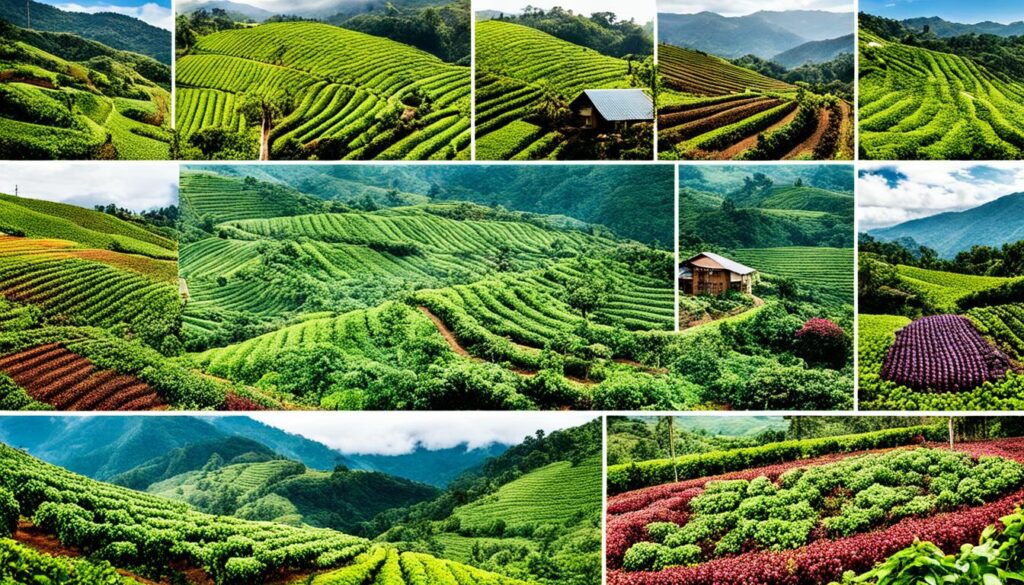
Starbucks’ Commitment to Ethical Sourcing
Starbucks works hard to ensure its coffee comes from ethical sources. They use the Coffee and Farmer Equity (C.A.F.E.) Practices to help. This program supports sustainable coffee growing and helps farmers and their communities.
The Coffee and Farmer Equity (C.A.F.E.) Practices
The C.A.F.E. Practices started in 2004 and look at over 200 economic, social, and environmental points. In partnership with Conservation International, Starbucks helps coffee farmers thrive. It focuses on ethical sourcing and provides support and fair pay to farmers, encouraging them to farm sustainably.
Investment in Coffee Communities and Sustainability
Starbucks has invested over $100 million in global coffee communities. They offer loans and resources through programs like the Global Farmer Fund. These efforts work towards a sustainable future for coffee farming, promoting growth and resilience.

Starbucks also gives out disease-resistant coffee trees to boost productivity. Its efforts, including the Sustainable Coffee Challenge, aim to make coffee the first sustainably farmed product. Through this, Starbucks ensures farmers do well economically and help their environment.
| Initiative | Description | Impact |
|---|---|---|
| C.A.F.E. Practices | Verification program promoting sustainable practices | Supports coffee farmer welfare and sustainable agriculture |
| Global Farmer Fund | Financial support through loans and resources | Improves farming conditions and economic stability |
| Disease-resistant tree donations | Enhances productivity and addresses climate issues | Promotes sustainability in coffee cultivation |
| Sustainable Coffee Challenge | Collaboration to make coffee sustainable | Transforms coffee into an environmentally friendly product |
Local Roasters: Pioneers of Ethical Coffee
Local coffee roasters stand out as leaders in ethical sourcing. They focus on quality, sustainability, and helping their communities. Through sustainable sourcing, they connect closely with the farmers who grow their coffee beans. This approach doesn’t just improve taste; it benefits everyone involved in making coffee.
How Local Roasters Source Their Beans
Local roasters choose beans from small, independent farms with clear supply chains. This shows their commitment to doing the right thing, making sure farmers are paid well. By working directly with farmers, they not only grow their business but also ensure we get to enjoy high-quality coffee with unique flavors.
Building Relationships with Farmers
For local roasters, strong bonds with coffee farmers are key. They often visit the farms to understand the farmers’ work and challenges. Such interactions build trust and highlight a shared dedication to quality coffee and eco-friendly methods. This sets them apart from big companies that may overlook these important connections.
Community Impact and Support
Local roasters are also known for their support of the community. They participate in projects to boost local economies and care for the environment. Their efforts include supporting education, health services, and improving local facilities in coffee regions. By doing so, local roasters create a positive impact that benefits both their communities and the farmers they partner with.
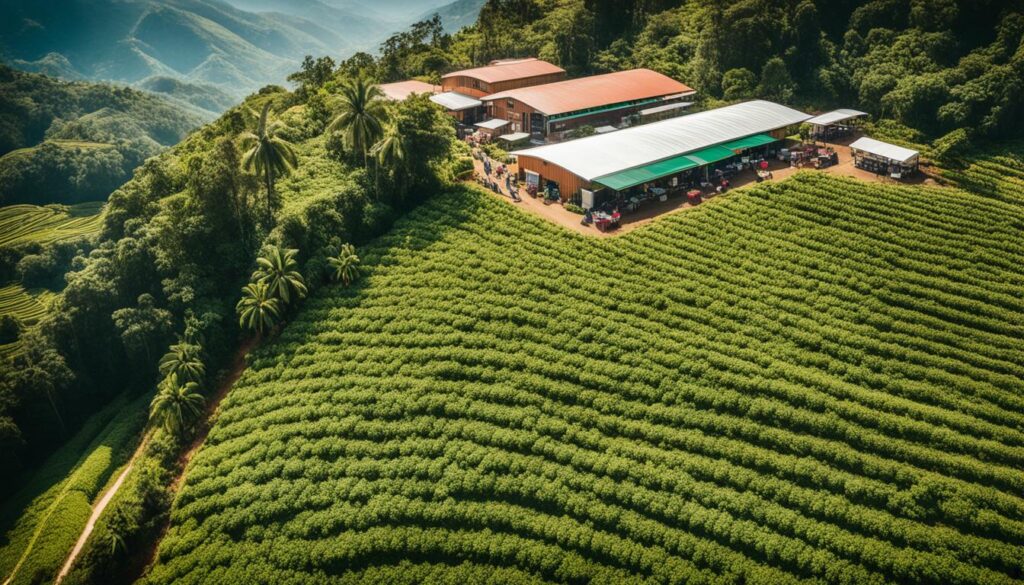
| Aspect | Local Roasters | Corporate Roasters |
|---|---|---|
| Source of Beans | Small, independent farms | Large plantations, multiple suppliers |
| Farmer Relationships | Direct engagement and support | Transactional interactions |
| Community Investment | Active programs for local development | Limited community engagement |
| Impact on Environment | Focus on sustainable practices | Varied, often less emphasis |
Comparing ethical practices: Starbucks vs. local coffee roasters
The struggle over ethical practices highlights differences between Starbucks and local coffee roasters. Starbucks implements large-scale programs for sustainability. However, local roasters use personal strategies that help them connect closely with coffee farmers.
Sustainability Initiatives
Starbucks tackles environmental issues through its C.A.F.E. Practices, marking 99% of its coffee as ethically sourced. On the other side, local roasters focus on sustainability from sourcing to packaging. For example, shops often choose single-origin and organic beans to help communities financially.
Transparency in Sourcing
Transparency in where coffee comes from is key to the ethical debate. Starbucks has a broad data system to track its coffee but often leaves out roast dates and origin details. In contrast, local roasters, like JavaPresse, build direct links with farmers. This boosts trust with consumers and clearly shows their ethical efforts.
Economic Impact on Coffee Farmers
The effect on coffee farmers differs greatly between Starbucks and local roasters. Starbucks strives for sustainability and fair wages in the long run. But local roasters can pay farmers more, based on their specific needs. This approach fosters close partnerships, offering immediate benefits to coffee farmers. It shows there are many ways to source coffee ethically.
| Aspect | Starbucks | Local Roasters |
|---|---|---|
| Sustainability Initiatives | Comprehensive programs like C.A.F.E. | Grassroots efforts focused on local impact |
| Sourcing Transparency | Uses data systems but lacks detailed info | Direct relationships with farmers enhance transparency |
| Economic Impact | Standardized fair wages | Higher premiums and flexible support |

The Role of Consumer Awareness in Ethical Brewing
Consumer awareness is key in making the coffee industry more ethical. People are now choosing brands that care about the environment and fair working conditions. This shift means consumers are actively shaping the industry. They demand transparency and want sustainable coffee.
Shifting Preferences Toward Ethical Choices
There is a growing demand for ethically sourced coffee. This reflects a change in how people think about their purchases. They prefer to support brands that follow ethical practices. As a result, big companies and local shops are starting to source their coffee more responsibly. They aim to meet the demands of ethical shoppers.
How Consumers Can Impact the Coffee Industry
Consumers have a big impact on the coffee sector through their buying choices. By choosing ethically-focused companies, people can cause a big shift. This push for ethical coffee creates a culture where companies must adopt sustainable practices. By giving feedback and using social media, shoppers can stress the need for ethical behavior to brands.
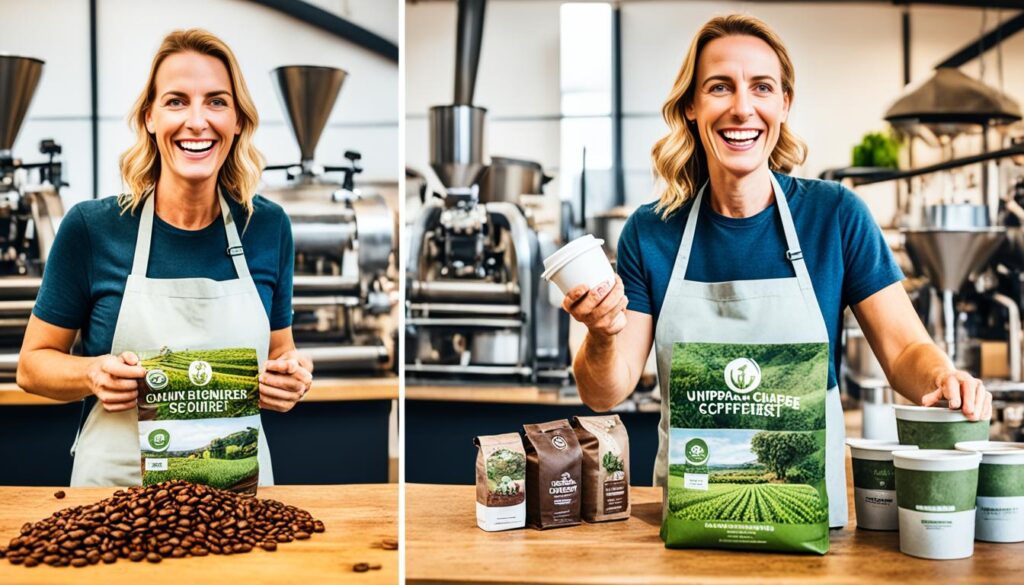
Challenges Facing Ethical Coffee Production
The ethical coffee industry is up against big challenges. These affect how coffee is made and its sustainability. For coffee farmers wanting to do well in a tough market, knowing about these problems is key. They face issues like environmental damage, not having enough money, and the need to keep up with what coffee drinkers want.
Environmental Concerns
Climate change and cutting down forests are big worries for coffee makers around the world. These changes make coffee plants more at risk, leading to less diversity in nature. Farmers and companies, like Starbucks and local shops, need to try new farming methods. They want to make less of a harm on nature from growing coffee.
Economic Constraints for Farmers
A lot of coffee growers deal with money problems that make it hard to keep making good coffee in a way that’s good for the earth. This is especially true in places where coffee is really important for the economy. Even though big companies like Starbucks try to help, smaller shops often work directly with the growers. This helps the farmers make more money and supports fair trade in the coffee world.
Market Competition and Consumer Demand
There’s a lot of competition in the coffee business, from big companies to small shops. This fight to be the best leads to new and better ways of doing things but can also make prices an issue. With more people wanting coffee that’s made right, big and small brands need to be clear about how they make their coffee and focus on sustainability. This way, they can attract customers who care about these things.

| Challenge | Impact on Farmers | Industry Response |
|---|---|---|
| Environmental Concerns | Vulnerability of coffee crops due to climate change | Implementing sustainable farming practices |
| Economic Constraints | Inability to produce quality coffee sustainably | Building direct connection with consumers |
| Market Competition | Pressure on pricing and sustainable practices | Enhancing transparency and innovation |
Trends in the Coffee Industry: The Rise of Local Roasters
The coffee world is changing fast. Now, more people visit specialty coffee shops. They love the great taste and the stories of where their coffee comes from. Local roasters are becoming the stars of this new scene. They offer coffees that are not only delicious but are also ethically made.
The Growth of Specialty Coffee Shops
Specialty coffee shops are more popular than ever. People care a lot about where their coffee is from and that it’s made well. These places celebrate the local scene and bring people together. Customers learn about their coffee’s journey, from the farm to their cup.
How Local Roasters Are Innovating
Local roasters love to try new things. They explore different ways to roast and brew coffee. This has led to exciting coffee trends. They find unique beans and try new ways to bring you your coffee. People love this because they always get to try something new and special.
Creating Unique Flavor Profiles
Local roasters are great at making unforgettable coffee. They pick their beans carefully. This lets them bring out all kinds of tastes, from fruity to chocolatey. By doing this, they keep their customers coming back for the unique flavors they love.
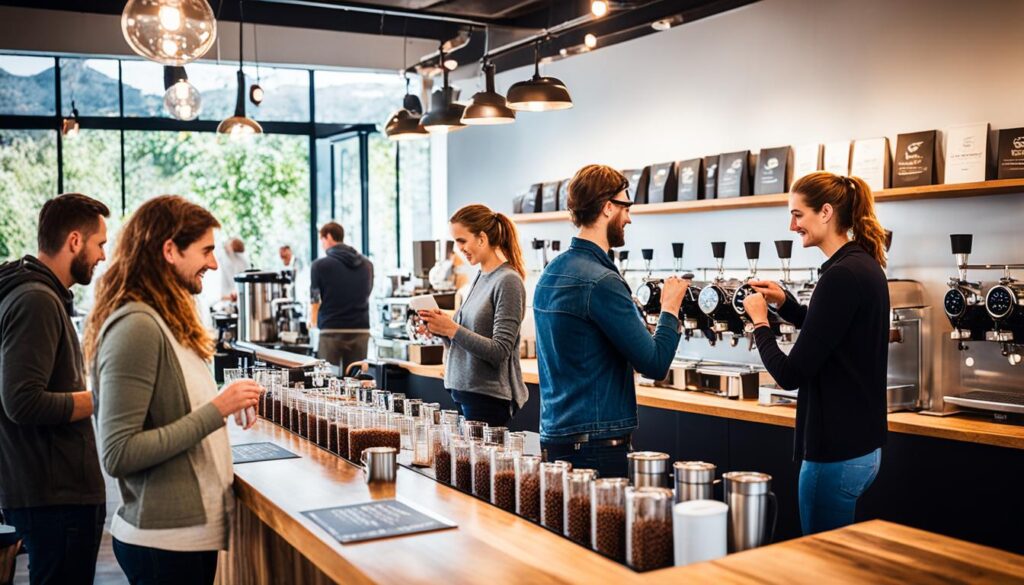
| Aspect | Local Roasters | Starbucks |
|---|---|---|
| Number of Locations | Varies by region | Over 30,000 |
| Market Focus | Specialty coffee and local community | Mass market and global reach |
| Innovation | High emphasis on unique flavor profiles | Standardized offerings with limited seasonal innovations |
| Sourcing Practices | Creative sourcing and direct relationships | Various global forward-sourcing strategies |
| Consumer Connection | Strong community ties and storytelling | Corporate brand recognition |
Conclusion
Starbucks and local roasters show different, yet vital, approaches to ethical coffee. Starbucks is a worldwide giant with over 31,000 shops. They invest heavily in sustainability and sourcing. Local roasters, however, focus on their communities. They work closely with farmers and use innovative sourcing for quality and ethics.
Choosing between Starbucks and local roasters shows what you value in sustainability and community impact. Your choices as a consumer help promote ethical practices. This support helps both big and small players in the coffee field. As more people become aware, they can push the market towards better ethics in coffee.
The future of coffee needs both global standards like Starbucks’ and local initiatives for sustainable change. The ethical coffee journey is growing thanks to the different benefits of both models. They are shaping the coffee industry for the future.
